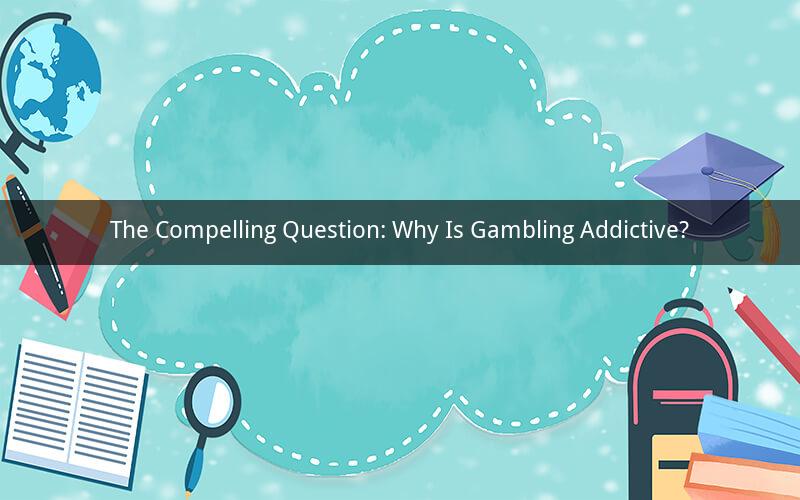
Introduction:
Gambling has been a part of human culture for centuries, offering excitement, entertainment, and the allure of winning big. However, along with its thrilling aspects, gambling has also been associated with addiction. This article delves into the reasons why gambling can be addictive, exploring the psychological, biological, and social factors that contribute to its addictive nature.
1. The Psychological Aspects of Gambling Addiction:
a. The Dopamine Rush:
One of the primary reasons why gambling can be addictive is the release of dopamine, a neurotransmitter responsible for pleasure and reward. When a person wins, their brain releases dopamine, creating a sense of euphoria and reinforcing the behavior of gambling.
b. The Thrill of Risk:
Gambling involves taking risks, and the anticipation of winning can create a thrilling experience. This thrill can be addictive, as individuals seek the same level of excitement and adrenaline rush with each gamble.
c. The Illusion of Control:
Gamblers often believe they have control over the outcome of the game, leading to a false sense of security. This illusion of control can make individuals more inclined to continue gambling, even when they are losing.
2. The Biological Aspects of Gambling Addiction:
a. Genetic Factors:
Research suggests that genetics play a role in the susceptibility to gambling addiction. Certain genetic markers have been identified that may make individuals more prone to developing an addiction.
b. Brain Chemistry:
The brain chemistry of individuals with gambling addiction can be altered. The prefrontal cortex, responsible for decision-making and impulse control, may be less active in these individuals, leading to a higher risk of addictive behavior.
3. The Social Aspects of Gambling Addiction:
a. Peer Influence:
Individuals who are surrounded by others who gamble may be more susceptible to developing an addiction. Peer pressure and the desire to fit in can contribute to the onset of gambling addiction.
b. Media and Advertising:
The media and advertising industry play a significant role in promoting gambling. The portrayal of gambling as glamorous and exciting can create a desire to engage in the activity, increasing the likelihood of addiction.
4. The Economic Impact of Gambling Addiction:
a. Financial Strain:
Gambling addiction can lead to significant financial strain, as individuals may continue to gamble despite negative consequences. This can result in debt, bankruptcy, and strained relationships.
b. Lost Opportunities:
The time and energy spent on gambling can lead to the neglect of other important aspects of life, such as work, relationships, and personal development.
5. Treatment and Prevention:
a. Treatment Options:
There are various treatment options available for individuals struggling with gambling addiction. These include therapy, support groups, and medication.
b. Prevention Strategies:
Prevention strategies involve raising awareness about the risks of gambling addiction, implementing responsible gambling measures, and providing education on the dangers of excessive gambling.
Questions and Answers:
1. Q: Can gambling addiction be cured?
A: Yes, gambling addiction can be treated and managed. With the right support and intervention, individuals can overcome their addiction and lead a healthier life.
2. Q: Is online gambling more addictive than traditional gambling?
A: Online gambling can be more addictive due to its convenience and accessibility. The ability to gamble from the comfort of one's home can make it easier to develop an addiction.
3. Q: Can gambling addiction be prevented?
A: Yes, gambling addiction can be prevented through education, responsible gambling measures, and raising awareness about the risks associated with excessive gambling.
4. Q: Are there any warning signs of gambling addiction?
A: Yes, common warning signs of gambling addiction include hiding gambling activities, borrowing money to gamble, feeling remorse after gambling, and neglecting other important aspects of life.
5. Q: Can medication help treat gambling addiction?
A: Medication can be used as part of a comprehensive treatment plan for gambling addiction. Antidepressants and anti-anxiety medications may be prescribed to help manage symptoms and reduce cravings.